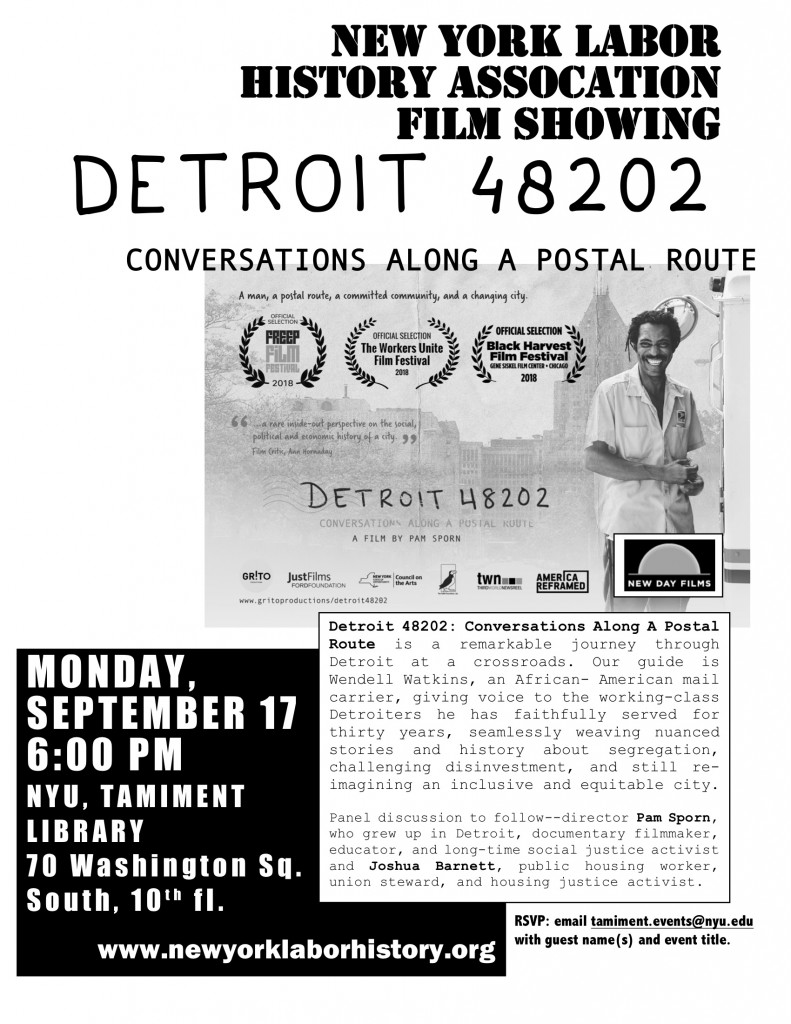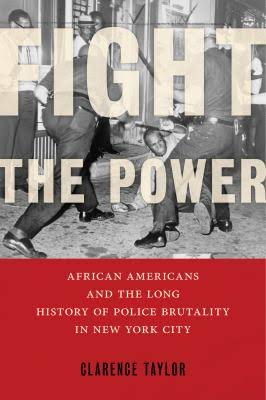Summer-Fall 2018 Edition of Work History News!
The Summer-Fall 2018 edition of NYLHA’s newsletter, Work History News, is now available online. As always, members will receive a free print copy in the mail–to join or renew, go here!
New York Labor History Association
A bridge between past and present

The Summer-Fall 2018 edition of NYLHA’s newsletter, Work History News, is now available online. As always, members will receive a free print copy in the mail–to join or renew, go here!
Join the NYLHA on Monday September 17 – 6pm for a special screening of
Detroit 48202 – Conversations Along A Postal Route, a remarkable
documentary by Pam Sporn. 
Discussion with the director and housing activists to follow.
Tamiment Library,70 Washington Square South, 10th floor, NYU.
RSVP to tamiment.events@nyu.edu with guest name(s) and event title
We are pleased to launch a new feature, our seasonal Book Nook. Four times a year, we will be asking a few friends what they are reading, and what relevance it might have for our troubled times. We hope that you will circulate the postings and enjoy the books highlighted therein. Emily Dickinson said it best: “There is no frigate like a book …” Still true.
Many thanks to our own Jane LaTour, for conceiving this new feature and making it happen!
 Clarence Taylor
Clarence Taylor
Professor Emeritus, Department of History, Baruch College, CUNY
Author, whose works include the forthcoming Fight the Power: African Americans and the Long History of Police Brutality in New York City (New York University Press, January 2019)
I’ve been reading Eisenhower vs. Warren: The Battle for Civil Rights and Civil Liberties, by James F. Simon. The important message that we can apply today is that the battle for civil rights and civil liberties is a constant battle. The other important lesson is that the Supreme Court matters. It was the Warren Court that protected civil rights and civil liberties against an administration that would have trampled on these rights.
Bette Craig
President, South Williamstown Community Association; Documentary Filmmaker, A Home Movie; Playwright, I Just Wanted Someone to Know; Producer, The Labor Theatre (1973—1985)
I’m reading Educated, by Tara Westover, a remarkable memoir by a young writer raised by survivalist Mormons in rural Idaho. It’s a story of her awakening to the rest of the world and the need for knowledge about it. She was home schooled to only a slight extent but was able to do enough self-education to be accepted to Brigham Young University and start to leave her family. The pull between leaving her family’s world and their deeply held truths and opening herself to new experience is thrillingly told.
Telex from Cuba, a novel by Rachel Kushner published several years ago (she has a new one out, The Mars Room) told primarily from the point of view of two children, one whose father worked for United Fruit and the other who worked for a nickel mining company in Southern Cuba. It’s set against the background of the Cuban Revolution in the 1950s. Its veracity and air of personal experience is fed by Kushner’s mother’s experience of growing up in Cuba during that time as a child of a United Fruit manager.
And then there’s Peggy Seeger’s memoir, First Time Ever, which I love. She is Pete Seeger’s much younger half-sister, who played an important role in the folk revival in the United Kingdom during the 1970s. This sent me back to reading her husband, Ewan MacColl’s autobiography, Journeyman. We (Bette and her husband, Chuck Portz, also of the Labor Theatre) got to know Peggy and Ewan during the time we spent in London in 1978 and went to see them perform in a folk club. We had dinner at their house once then, and after we ate, they gave us a family concert with their children performing as well Since Ewan’s first wife had been Joan Littlewood, famed for “Oh, What a Lovely War,” and he had spent his youth doing political theater and trying to connect with a working class audience, we had much in common. Both books deal a lot with the struggle to be an artist and also an activist.
Mike Miller
Organize Training Center, San Francisco CA; SNCC, Mississippi, California, 1962—67; Author, Community Organizer’s Tale, A: People and Power in San Francisco (Heyday, 2009)
The books I’m reading now are Liberty or Death, about the French Revolution; Jackson Rising: The Struggle for Economic Democracy and Black Self-Determination in Jackson, Mississippi, by a local organizer/activist there named Kali Akuno; Chicanos in California, a History of Mexican Americans in California, by Albert Camarillo; Pimp, The Story of My Life, by Iceberg Slim, and just finished We Are Not Afraid, by Gila Lustiger, which is a reflection on Muslim immigrants in Paris.